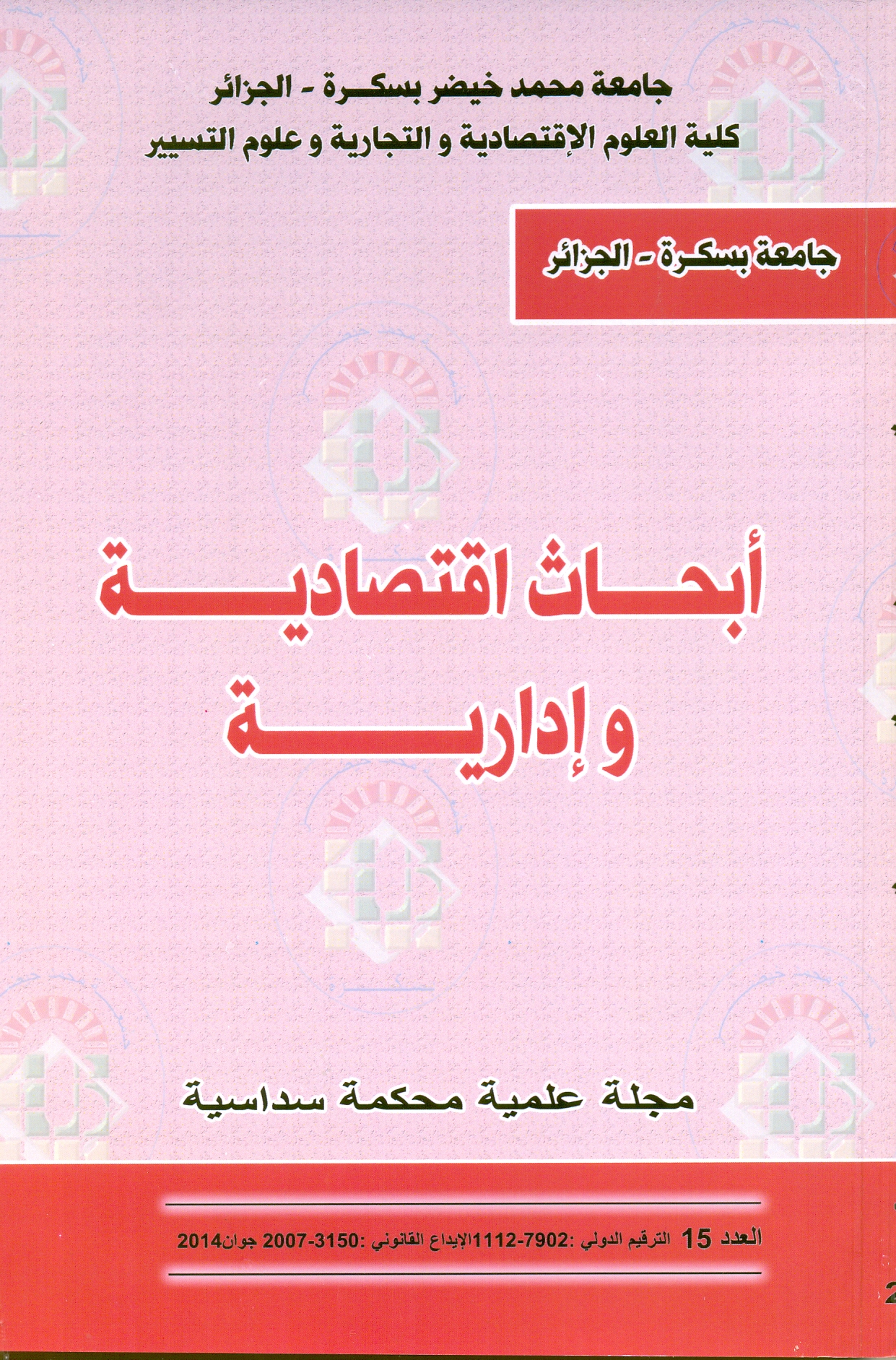الموارد الطبيعية الناضبة وأثرها على النمو الاقتصادي: دراسة حالة البترول في الجزائر
Résumé
يعد موضوع اقتصاديات الموارد الطبيعية الناضبة أحد القضايا الأساسية التي أخذت اهتمام الاقتصاديين والدول الغنية بها خاصة في الآونة الأخيرة، وتتم دراستها في إطار قسمين رئيسيين بحيث يهتم القسم الأول بدورها في عملية النمو الاقتصادي في إطار نظرية لعنة الموارد، أما الثاني فيهتم بكيفية تخصيصها. ونهدف في مقالنا هذا إلى توضيح أثر استخدام البترول وعوائده على النمو الاقتصادي في الجزائر، وقد توصلنا إلى أن تزايد معدل استخدام البترول وعوائده ذو أثر سلبي وذلك من خلال الحد من نمو القطاعات الإستراتيجية، حيث أن الثراء الناتج هو ظاهري فقط يتمثل في نمو المؤشرات الاقتصادية الكلية، وبالتالي فإن الجزائر تعاني من لعنة الموارد.
الكلمات المفتاح: الموارد الطبيعية الناضبة، النمو الاقتصادي، لعنة الموارد، نموذج Stiglitz، التكامل المتزامن، نموذج تصحيح الخطأ.
Abstract
The economics of natural resources depleted is fundamental issues took the attention of economists and the rich countries to these resources, especiall in recent times. Exhaustible resources are study in the context of two major parts so intersted in the first part on its role in the processus of economic growth under the theory of the resource curse, and the second interested in how to allocate it. The aim of our article is illustrating the impact of the use of oil and its returns on economic growth in Algeria. We found that the superfat rate of use of oil and its returns have a negative effect through the reduction of the growth of strategic sectors since the rich output is superficial only on the growth of macroeconomic indicators. So Algeria suffers from the curse of resources.
Key words : exhaustible resources, economic growth, resource curse, model of Stiglitz, cointegration, error correction model.
Références
د.حمد بن محمد آل الشيخ [2008]، اقتصاديات الموارد الطبيعية والبيئية، العبيكات، الطبعة الأولى، ص: 20.
د.حمد بن محمد آل الشيخ، مرجع سبق ذكره، ص: 21.
د.أحمد مندور، د.أحمد رمضان، اقتصاديات الموارد الطبيعية والبشرية، الدار الجامعية ، ص: 33.
د.عبد المطلب عبد الحميد، د.محمد شبانة، مرجع سبق ذكره، ص: 47.
Taladidia Thiombiano (2004), Economie de l’environnement et des ressources naturelles, L’Harmattan, p : 62.
Gille Rotillon, Economie des ressources naturelles, La Découverte, p : 9.
Charles Perrings (1987), Economy and environment, A theoritical Essay on the Interdependence of Economic and Environmental Systems, Cambridge University Press, p :31.
د.عبد المطلب عبد الحميد، د.محمد شبانة، مرجع سابق، ص: 201.
J.L.Bobin, E.Huffer, H.Nifenecker (2005), L’énergie de demain, EDP Sciences, p :206.
Confiance.forumactif.com/t7-topic.
د.أحمد مندور، د.أحمد رمضان، مرجع سابق، ص: 151.
Ar.wikipedia.org/wiki/نفط
www.darah.org.sa/bohos/data/14/6-1.htm.
Ar.wikipedia.org/wiki/غاز_طبيعي
د.رمزي صنصور، د.بلال عموص، التربية البيئية مرجع عن البيئة العالمية، مركز علوم الصحة البيئة والمهنة،جامعة بيرزيت،ص 108.
Ar.wikipedia.org/wiki/معدن
Ar.wikipedia.org/wiki/معدن
Ar.wikipedia.org/wiki/minéral
Terry L.Karl, Oil lead development : Social, Political and Economic Consequences, Development and the role of law working paper, California : Stanford University, Center of Democracy, January 2007,p :2.
Adam Wellstead, The (post) staples economy and the (post) staples state in historical perspective, Canadian Political Science Review, Vol 1, June 2007, p : 08.
Micheal Ross, Extractive sectors and the poor, Oxfam American Report, October 2001, p : 06.
Micheal Ross, Opcit, p : 06.
S. Mansoob Murshed, When does natural resource abundance lead to a resource curse ?, Environmental Economics Programme, Discution paper04-01, March 2004, p : 07.
Olomola Philip Akanni, Oil wealth and economic growth in oil exporting African countries, AERC Research Paper 170 , September 2007, p : 01.
Jeffrey D. Sachs, Andrew M. Warner, Natural resource abundance & economic growth, Center for International Development and Harvard Institute for International Development, Harvad University, November 1997, p : 11.
Argentino Pessoa, Natural resources and institutions : The « natural resource curse » revisited, Faculdade de Economia do Porto, p : 05.
Argentino Pessoa,Opcit, p :07.
Jean Philip C.Stijins ; Natural resource abundance and economic growth revisited, University of California at Berkeley, First draft: May 1999; Current draft: March 2001, p : 07.
Abdelkader Sid Ahmed (1975), Economie de l’industrialisation à partir des resources naturelles I.B.R, TOME 2, PUBLISUD, p : 47.
Natalie St. Hilaire, Dutch Disease, Oil and Developing Countries, December 2004, p : 02.
Mark Gallagher , Steve Rozner, Tools for treating resource curse, From Curse to Cures, Developing Alternatives, volume 11, issues 1, Spring 2007, p :28.
www.sonatrach-dz.com/arabe/histoire.html
www.sonatrach-dz.com/arabe/histoire.html
www.petrochem2000.com/data/docs
Abdelmajid Attar et Zerrouk Djerroumi, Le partenariat dans le secteur des hydrocarbures en Algérie : Historique, Enjeux et Expeience, 2006, p : 4.
الحفر الاستكشافي هو حفر آبار في حقول جديد بهدف الحصول على اكتشافات نفطية أو غازية جديدة.
الحفر التطويري هو حفر آبار في حقول سبق اكتشافها وثبت وجود المحروقات فيها ويهدف إلى تقييم دقيق للاحتياطات الموجودة في هذه الحقول.
تقرير الأمين العام السنوي، العدد 37، منظمة الدول العربية المصدرة للبترول، 2010، ص: 198.


